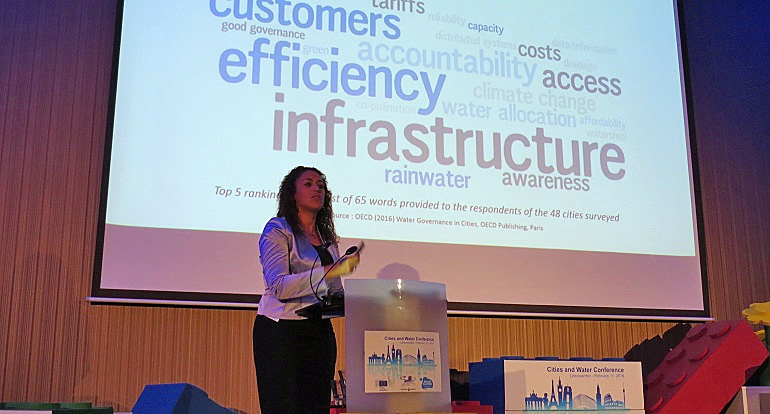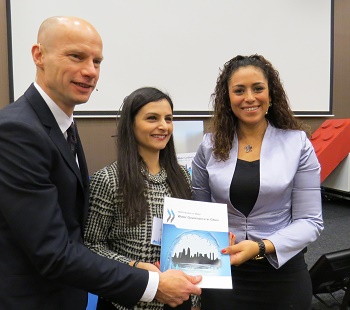Cities & Water conference: Before fixing the urban water pipes, fix the institutions
 “The discussion on urban water supply goes beyond the utilities. The wider urban water issue also include spatial planning, upstream and downstream water management and citizens participations. Fixing the pipe, should start with fixing the institution”, said Aziza Akhmouch, head of the Water Governance programme at the OECD on the occasion of the publication of the new OECD report Water governance in cities.
“The discussion on urban water supply goes beyond the utilities. The wider urban water issue also include spatial planning, upstream and downstream water management and citizens participations. Fixing the pipe, should start with fixing the institution”, said Aziza Akhmouch, head of the Water Governance programme at the OECD on the occasion of the publication of the new OECD report Water governance in cities.
Akhmouch presented the report at the Cities & water conference that takes place in Leeuwarden on 11 February. She presented the first edition to Henk Ovink, special envoy for international water affairs for the Netherlands.
The Cities & Water conference is organised as an extension of the EIP Water conference that took place in Leeuwarden the day before. The conference is meant to get the issue of urban water higher on the European political agenda.
The conference will be closed with the kick off of the Urban Water Agenda 2030 for European cities.
 Aziza Akhmouch (right) of OECD hands over the new OECD report on urban water governance to special Dutch water envoy Henk Ovink (left).
Aziza Akhmouch (right) of OECD hands over the new OECD report on urban water governance to special Dutch water envoy Henk Ovink (left).
Understanding urban water governance
The new OECD report on water governance in cities, is based on a study of 48 cities in 17 different countries.
The study was conducted to get a better understanding of the decision making, the institutional rules, implementation processes and the accountability for authorities to deliver what they promise.
According to Akhmouch the study showed that cities are mainly concerned about their small staff and limited budgets to manage the water infrastructure. “They report that is it difficult for them to raise the water tariffs”.
Metropolitan reforms
Many cities are in the process of reorganisation into metropolitan governmental structures. This makes the institutions that are now responsible for the water infrastructures to hold new projects.
It also showed that the cities themselves cannot cope with the magnitude of the water challenges. Many water issues are dealt with on a national level and are beyond the control of cities.
Climate change, economic crises, demographic growth, urban trends add to that.
Read the summary of the report ‘Water governance in cities’ on the website of the OECD
Read more on this website
• Cities & water conference: Leeuwarden declaration sets out for ambitious goals on urban water, 12 February 2016
• EIP Water conference: Start-ups and innovation is a difficult mix in a fragmented water sector, 11 February 2016
• EIP Water conference: Stronger public sector to lead water innovation for future markets, 10 February 2016
• EIP Water Conference 2016 to discuss actions and recommendations on water innovation, 5 February 2016
• Mayors & Water conference to agree on joint 2030 agenda for urban water, 3 February 2016
More information
www.watercampus.nl/mayors-water



